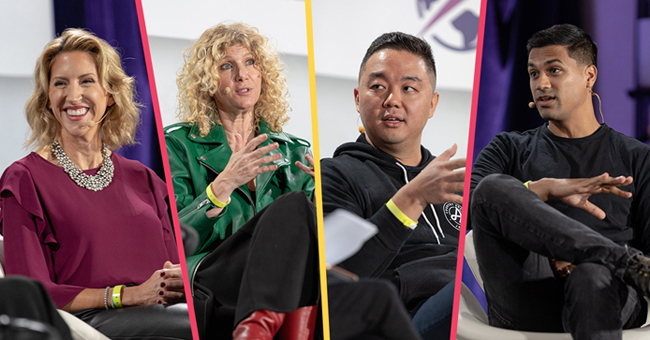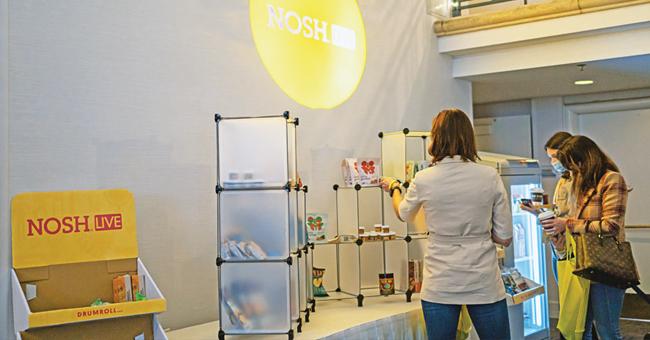The Importance of Scrappiness and Storytelling: NOSH Live 2021 Recap
After an evolutionary year of changing trends and consumer shopping habits, natural food industry leaders converged in Santa Monica in December for NOSH Live Winter 2021 to discuss the state of the industry and outline a vision for the path forward.
Erewhon chief growth officer Kabir Jain, CAULIPOWER founder and CEO Gail Becker, Country Archer Provisions co-founder and CEO Eugene Kang and Loft Growth Partners Liz Myslik kicked off the first day with a wide-ranging discussion on how retailers, investors and entrepreneurs have been impacted by a challenging market environment over the past year.
Supply chain disruption has continued to weigh on companies large and small. Despite brands’ best efforts to establish solid products and marketing plans, these supply chain issues have put a “tremendous strain” on industry members, Becker said. These challenges have created a “ripple effect” across not only brands, but also retailers due to shortages and out-of-stock issues. According to Myslik, brands are now more focused than ever on supply, which ultimately presents an opportunity to establish a stronger supply chain that will make brands better overall.
Trying to maintain stability within this volatile market is no easy feat, Kang admitted, but the ability to control your business’ “controllables” is key. This includes building strong lines of communication with retailers and other partners across the supply chain and having honest and transparent conversations, which Kang described as “eye-opening” for Country Archer.
As consumers migrated to D2C shopping during the pandemic, brands and retailers were forced to evolve to meet their needs with an omnichannel presence. Now consumers have returned to stores and retailers are adapting to the types of products consumers want and how they want to buy them, Myslik said.
Later in the day, The Hartman Group CEO Laurie Demerritt examined how food companies can use brand attributes and mission to establish loyal consumer bases as many macro and micro cultural forces are interplaying and affecting consumer choices.
Closing out the day, natural products retailer Earth Fare took to the stage to discuss its whirlwind year in 2020. After announcing it would close due to financial challenges the grocer ultimately reopened later in the year.
At this time, Gavin Konkel, VP of center store merchandising at Earth Fare, said the natural retailer decided to take what was working the best within the store, adopting an entrepreneurial spirit to maximize opportunities. Earth Fare took this new opportunity to establish a new vision and strategy around its “food philosophy,” enhancing its merchandising standard and evaluating overexposed categories — diving deeper into functional foods and pulling back in segments such as yogurt.
As Earth Fare evolves, Konkel said brands looking to land on its shelves or any other grocery shelves need to see if their product is a fit by getting to know a retailer, which will ultimately help them sell to buyers. Konkel noted that “getting in is easier than staying in” so establishing strong relationships with buyers is essential.
Day two of NOSH Live Winter 2021 brought discussions on how brands can position themselves for success with regards to the current state of the industry including shifting consumer interests and a dynamic landscape for brand building.
Acid League co-founders Allan Mai and Cole Pearsall and Chrisitina Pearson, Global Category Manager at Whole Foods, took to the stage announcing Acid League will be launching 12 new sauces and condiments with the retailer early on in the new year. The new products include everything from an 1860s cocktail sauce to a modern take on ketchup. In tandem with the new product announcement, the trio also discussed how they have navigated their brand-retailer partnership and how a sense of positivity, clear and consistent communication and a willingness to compromise allowed this partnership to grow and thrive.
According to Pearsall, Whole Foods essentially serves as the company’s “testing ground” for new products, noting that launching exclusives with the retailer has given them valuable data and proof of concept within the category. By launching these exclusives, Pearsall said they have elevated the brand’s other retail partnerships because they are able to pitch new products with a sense of confidence, data and a solid proof of concept behind its more unique innovations.
However, the relationship isn’t one sided. Pearson emphasized that for Whole Foods, Acid League’s in-house operations brings a sense of stability to the shelf, especially over the course of the past year where manufacturing disruptions impacted every category. She highlighted the company’s ability for the most part to avoid out-of-stocks and, when they couldn’t, easily communicate that production might be strained.
Another highlight from day two included Ashley Alden, VP of Merchandising at Foxtrot sitting down with NOSH editor Carol Ortenberg to discuss how the company is modernizing the approach to the traditional corner store through an innovative retail and delivery format catering to all-day use occasions and the contemporary consumer.
The brick-and-mortar Foxtrot locations offer a typical retail experience with an data-curated array of products on shelf. In addition to retail, the store also has a food service component, “transitioning from coffee shops to a wine bar throughout the day” said Alden. This brings in consumers who may just want to grab a cup of coffee to then discover the wider variety of services this modern c-store has to offer. The stores also serve as “micro-fulfillment centers” enabling Foxtrot to deliver products across its CPG and foodservice portfolios in under an hour.
However, when it comes to growth, Alden believes it is Foxtrot’s relationship with its brands and consumers that allowed the company to expand at such a rapid pace. She emphasized the company’s “commitment to community” and highlighted how the retailer has also taken an active role in shaping local brands so they would be positioned for success once they reach the shelf.
Currently Foxtrot operates 15 retail locations in cities including Chicago, Washington D.C. and Dallas and over the next year, 50 new Foxtrot locations are set to pop up in cities such as New York, Los Angeles and Boston. Alongside this expansion Alden said it’s close-knit team, which currently includes only three category managers responsible for bringing in and managing brands, will also undergo a significant expansion.


Receive your free magazine!
Join thousands of other food and beverage professionals who utilize BevNET Magazine to stay up-to-date on current trends and news within the food and beverage world.
Receive your free copy of the magazine 6x per year in digital or print and utilize insights on consumer behavior, brand growth, category volume, and trend forecasting.
Subscribe
